ADHD and Anxiety: Are They Linked?
Anxiety and ADHD are conditions that can cause serious learning difficulties according to their symptoms. To prevent the negative effects of these disorders, to boost attention and to overcome stress, fun scientific brain games like MentalUP Attention Exercises would be beneficial.
The Relationship Between ADHD and Anxiety - Shared Symptoms and Differences
According to the Centers for Disease Control and Prevention (CDC), up to 30% of children with Attention Deficit Hyperactivity Disorder also have an anxiety disorder. The research also states comorbidity between ADHD and anxiety reaching 25% in many samples.
ADHD is not an anxiety disorder. However, an anxiety disorder may occur in children or adults with ADHD. In addition to that, if both anxiety and ADHD symptoms are observed in adults or children, anxiety can be a factor that strengthens ADHD symptoms.
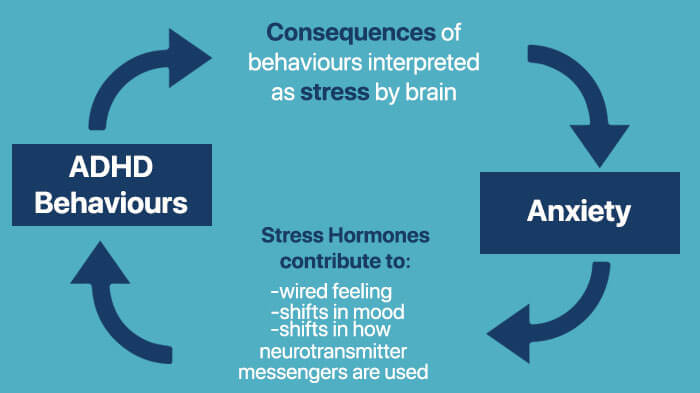
What Are the Similarities Between ADHD and Anxiety
Similarities between anxiety and ADHD can be named under behavioral disorders that adults or children with these conditions will encounter. These can be listed as below:
- Inattention
- Distraction
- Fidgeting
- Disorganization
- Poor time management
- Difficulty concentrating
- Difficulty remembering
- Procrastination
- Introversion
- Getting stuck
- Excessive Worrying
What Are the Differences Between ADHD and Anxiety
The difference between anxiety and ADHD is based on the source of the individual's focus problem. Some individuals cannot focus due to fearful, anxious thoughts. Or even if their mind is calm, they cannot focus because they are easily distracted.
In short, children with anxiety disorders will also have a poor capacity to focus because their mind is busy with anxious, worrying thoughts. Anxiety can contribute to poor school performance. That’s why beneficial games for children with anxiety and ADHD like MentalUP offers can create a significant difference.
However, the mind of children with ADHD may be silent, but their attention may be diverted often. They can only focus on one particular school task.
Let's examine the similarities and differences between anxiety and ADHD in a table to help you understand more clearly:
| Symptoms | ADHD | Anxiety |
|---|---|---|
| Difficulty concentrating or paying attention | ✓ | ✓ |
| Trouble completing tasks | ✓ | |
| Forgetfulness | ✓ | |
| Inability to relax or feelings of restlessness | ✓ | ✓ |
| Difficulty listening to and following instructions | ✓ | |
| Inability to focus for long periods of time | ✓ | |
| Chronic feelings of worry or nervousness | ✓ | |
| Fear without an obvious cause | ✓ | |
| Irritability | ✓ | |
| Trouble sleeping or insomnia | ✓ | |
| Headaches and stomachaches | ✓ | |
| Fear of trying new things | ✓ |
Misdiagnosis of Anxiety and ADHD
Children with anxiety can sometimes be misdiagnosed with ADHD or vice versa. Let's look at the reasons together.
Why Anxiety Gets Misdiagnosed as ADHD
Because, at first glance, ADHD or anxiety in adults or in children may appear to have similar symptoms as there are so many in common.
However, as we mentioned in the differences section, in addition to the symptoms observed, the main reasons for the presence of these symptoms should be examined. This is the most important way to make the correct diagnosis and apply ADHD and anxiety treatment correctly.
Where to Seek Help
Misdiagnosis causes many families to start treatment and recovery periods late. This can cause symptoms to develop more. Therefore, in order not to be misdiagnosed, and have complete awareness, you can check the following trusted institutions:
American Psychological Association
Make sure to visit the website of the American Psychological Association to have detailed information about ADHD as well as addiction, anger, anxiety, bullying, proper medication and other emotional health problems in detail. It will also help you find a psychologist in your area.
American Academy for Child and Adolescent Psychiatry
The Academy provides detailed up-to-date guides on ADHD diagnosis and treatment processes. It is a useful resource for both families and medical professionals.
American Psychiatric Association
Children with ADHD may also have different mental health problems. You can get real information about these possible problems, learn more about conditions such as anxiety disorders, depression and eating disorders, and reach reliable psychiatric clinics near you using this source.
Treating Anxiety and ADHD
A person with ADHD, who is anxious at the same time, may find it more difficult to concentrate on tasks. That means, when anxiety and ADHD symptoms are seen together, daily activities may become more difficult for the person. Therefore, getting the appropriate ADHD and anxiety treatment is crucial for an improved quality of life and a successful future. Using ADHD apps can help them cope with the difficulties they’ve been experiencing.
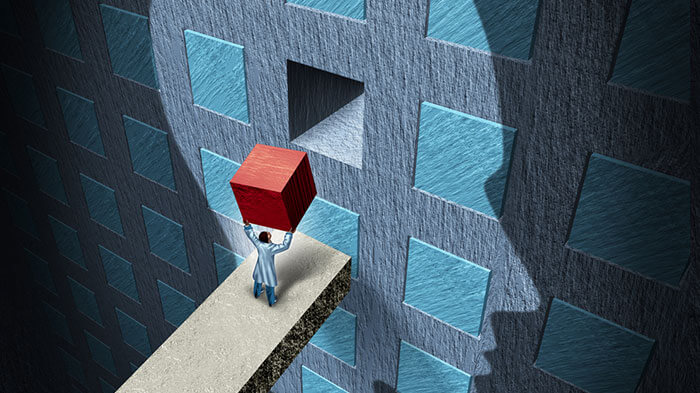
Treatment plans may vary depending on the person and the situation. If deemed necessary, it may be beneficial to treat both conditions at the same time. However, in some circumstances, treating only one may be a priority.
For example, if the stimulant drugs that are used cause symptoms of anxiety, non-stimulant drugs may be preferred. Also, anti-anxiety medications may also be considered to support the ADHD, anxiety and depression treatment. And the other condition may be supported with therapeutic or lifestyle interventions.
Medication for Anxiety and ADHD
Prescription drugs are mostly used for ADHD, depression and anxiety treatment. If taking several drugs is not recommended, or if the person does not prefer it, the doctor may prescribe medication for one of the disorders. For example, it is possible that ADHD treatment can relieve anxiety, so one may only need to take ADHD medication.
Now let’s list the most common ones from 3 main types of anxiety and ADHD medication:
Stimulant
The most common medication for anxiety and ADHD. Gives calmness. Side effects include stomach pain, irritability, decreased appetite and insomnia. Here are some examples:
- Adderall
- Dexedrine
- Focalin
- Methylin
- Ritalin
Non-stimulant
Either used in combination with a stimulant or as an alternative to it. It has fewer side effects when compared to stimulants like stomach pain or headache, irritability or depression. Some of the non-stimulant medicines for ADHD and anxiety can be listed as below:
- Catapres
- Intuniv
- Kapvay
- Strattera
Antidepressants
They are used less often than stimulants or non-stimulants. They can increase the risk of suicide in rare cases. Some examples like commonly known Wellbutrin for ADHD and anxiety can be listed as below:
- Bupropion (Wellbutrin)
- Desipramine (Norpramin)
- Imipramine (Tofranil)
- Nortriptyline (Pamelor)
- Venlafaxine (Effexor)
Therapy for Anxiety and ADHD
Therapy is a method that is frequently used as a supportive factor in the treatment of ADHD and depression and anxiety. By using the therapy method, healing can be raised in people with these conditions by increasing the patient’s awareness. There are 2 main therapy methods used in ADHD and anxiety treatment:
Cognitive-Behavioral Therapy (CBT)
This short-term intervention helps people change their way of thinking to positively influence their behavior. CBT is widely used for anxiety disorders and has been shown to be effective in treating GAD and many other conditions.
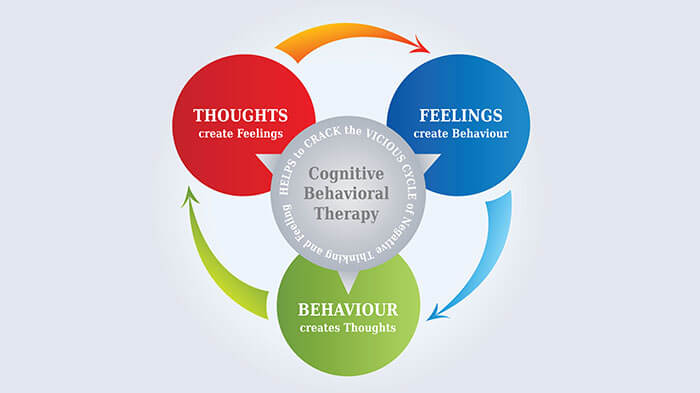
Relaxation Techniques
Practice techniques such as meditation, progressive muscle relaxation, visualization, and deep breathing exercises can help treat stress and anxiety by slowing the heart rate, reducing muscle tension, and increasing concentration and mood.
Supplements
ADHD and anxiety drugs don't work the same for every child in controlling symptoms. There are also potential side effects to consider. That is why some parents look for other natural remedies, such as nutrition, exercise, and supplements to deal with the symptoms seen in their child. Let’s have a look at some useful supplements for anxiety and ADHD:
- Omega-3 Fatty Acids
- Zinc
- Vitamin D
- Iron
- Multivitamin/Multimineral
- Magnesium
- Inositol
- Ginkgo Biloba
- Herbs for ADHD and anxiety like Bacopa and Gotu kola
- Essential oils for ADHD and anxiety
Tips for dealing with ADHD and anxiety
Sometimes, coping with ADHD and anxiety in children may be more challenging for a parent than experiencing these disorders. For this reason, it is especially important for adults to know important and practical tips on how to deal with ADHD and anxiety. Here are some useful tips:
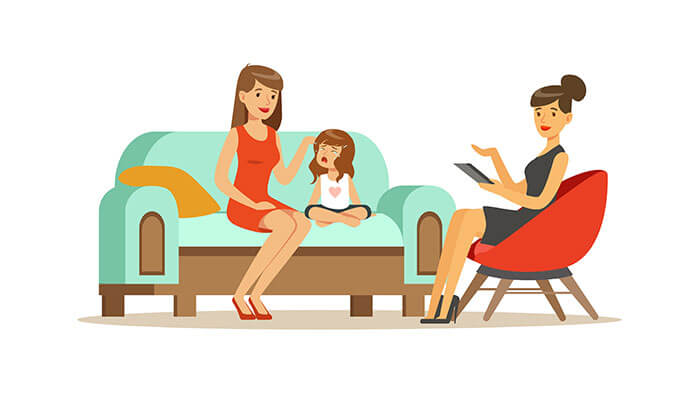
1. Inform Your Doctor: Even if you are not sure it is related to ADHD and anxiety, try to give your doctor as much information as possible about the symptoms you are experiencing. This will help the doctor make an accurate diagnosis and establish an effective treatment plan.
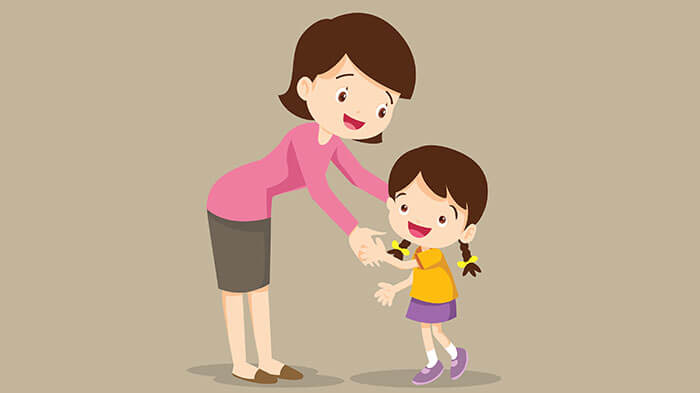
2. Be Patient: Anxiety can cause people to be afraid to try new things, including new treatments for anxiety and ADHD itself. It is therefore important to be patient because feeling anxious can also contribute to the lack of focus and forgetfulness experienced by those with ADHD.
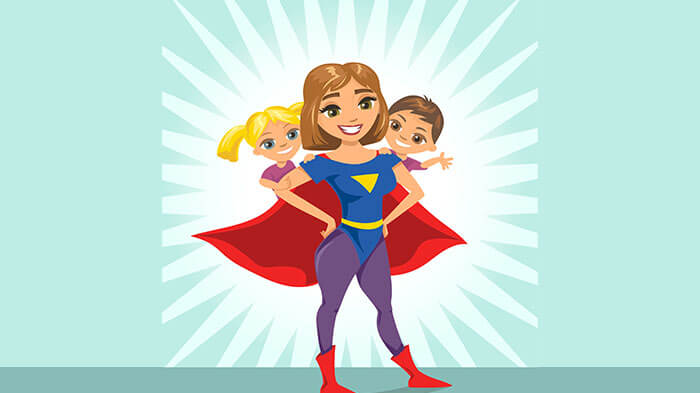
3. Be a Role Model: Children learn to respond to any situation based on their parents' reactions. Check parental anxiety because calm and positive parents of children with ADHD will affect their children in the same way in stressful situations.
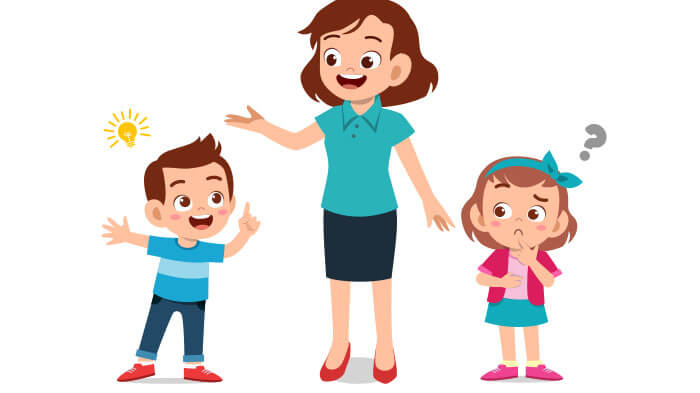
4. Improve Parental Skills: Parents can learn new ways to understand and help children with ADHD and anxiety. Consider training parenting skills.
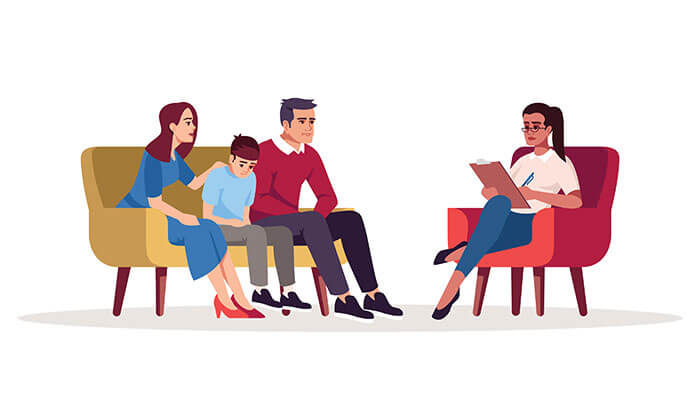
5. Consider Family Therapy: This will support family members who also need additional support to deal with the difficulties of living with someone with ADHD and anxiety.
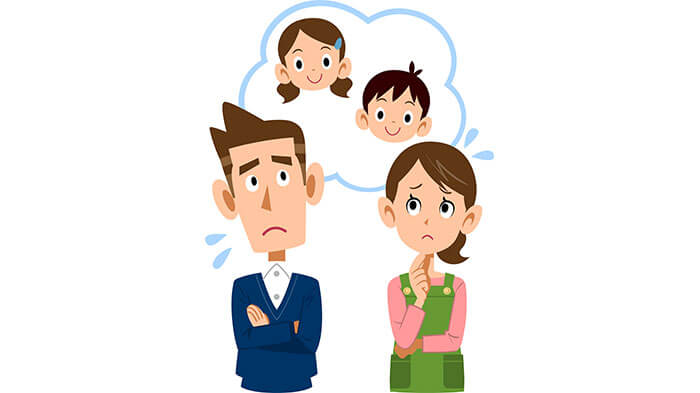
6. Overcome Parental Anxiety: Being critical or negative will only contribute to the stress and anxiety experienced by ADHD and those with anxiety. Regardlessly, try to help.
You can ease your struggles while parenting a child with ADHD with daily mental exercises like MentalUP scientific and fun brain games. Let MentalUP help your children improve their concentration, attention span and strengthen other cognitive skills and overcome anxiety with fun.
MentalUP is designed by academicians and pedagogues especially for kids to support their mental improvement.
FAQs About Anxiety and ADHD
How to deal with people with anxiety and ADHD?
Being calm and positive helps a lot when dealing with people with anxiety and ADHD because stress can affect them negatively and increase their stress levels which would intensify their anxiety and ADHD symptoms significantly.
How to help a partner with ADHD and anxiety?
The best way to help a partner with ADHD and anxiety is to start by learning about the role that ADHD plays in your life and also in your relationship. At this point, it will enable you to build a healthier and happier partnership, and to learn how you can choose more positive and efficient ways to respond to challenges and communicate with each other.
What medications are used to treat ADHD and anxiety?
Stimulant, Non-stimulant and Antidepressant medications are used to treat ADHD and anxiety.
How to deal with a child that has ADHD with explosive anger and anxiety?
Parents should be patient and positive while dealing with a child that has ADHD with explosive anger and anxiety. It would be highly beneficial to consult a good doctor in order to be able to apply the right treatment and thus improve the quality of life for both parents and their children.
How to mitigate insomnia with ADHD and anxiety?
Here are some tips to mitigate insomnia with ADHD and anxiety:
- Avoid napping before bedtime.
- Avoid drinking caffeine before bedtime.
- Create a calming routine before bedtime.
- Go to bed at the same time every day.
- Sleep in a dark and quiet room.
- Avoid looking at digital screens in the evening.
What clinical features do anxiety and ADHD share?
Here you can find all the clinical features of anxiety and ADHD:
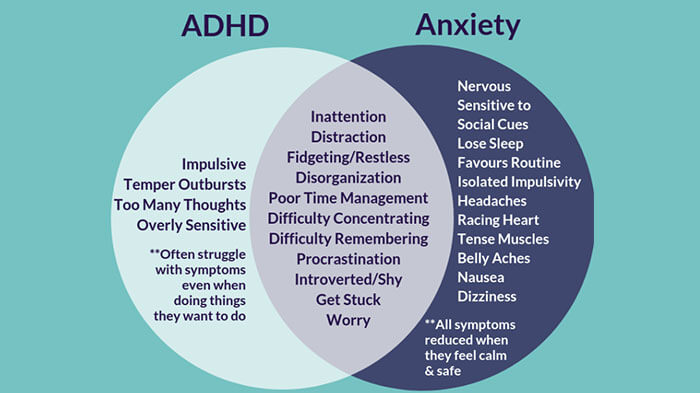
If you are interested in getting more information about ADHD, its symptoms, diagnosis, and treatment methods, you can have a look at MentalUP’s questions about ADHD blog page.
With 15-minute daily fun games of MentalUP, it is possible to increase your kids’ attention span and reduce anxiety levels.
Physical activities are also beneficial for children with ADHD and anxiety. MentalUP offers daily 7-minute fitness games for kids besides attention games. 🥳👟
You can start the attention and physical exercises now with MentalUP’s scientific games designed by academicians and professional game designers:


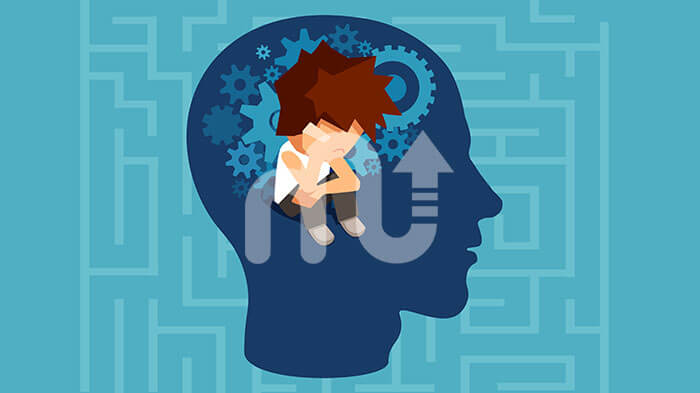


.jpg)
